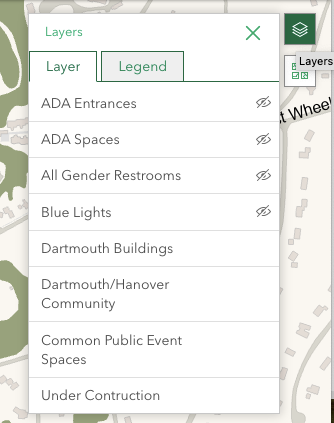Access and Inclusion
Diversity, Equity, Inclusion, and Belonging
New Student Orientation is committed to embracing diversity, fostering inclusion, and promoting equity through programs, support, services, and opportunities that bring together Dartmouth’s diverse community. Our commitment is driven by a firm belief that welcoming and supporting differences of identity, opinion, experience, and perspectives helps build a strong community.
We know that a sense of belonging is critical to successfully transitioning to our community and beginning your journey at Dartmouth. The programs within New Student Orientation are focused on supporting students in exploring, creating, and discovering what “belonging” feels like to them.
We’ve included some key definitions below to be helpful.
And make sure to explore this list of resources, from Dartmouth's Division of Institutional Diversity & Equity.
Land Acknowledgement
adapted from the Land Acknowledgement at Dartmouth's Hood Museum of Art
Dartmouth is situated upon the ancestral and unceded lands of the Abenaki people. This acknowledgement reminds us of the significance of place, the continued existence of Indigenous people, and Dartmouth's commitment to building respectful relationships with those who call these lands home today.
Religious Accommodations
Dartmouth has a deep commitment to support students’ religious observances and diverse faith practices. New Student Orientation works with the Tucker Center to support students who might need accommodations for religious or spiritual observances. Please feel free to email New Student Orientation and/or the Tucker Center with questions.
Access During New Student Orientation
New Student Orientation is committed to supporting incoming students as they transition to Dartmouth. We recognize that the needs of our students vary, and some may have different access needs.
We also recognize that inclusive access and accessibility helps not only students who have a disability or a short-term condition but all students. Regardless of how you identify, please take a moment to read this information as we believe that it may be helpful to all of you at some point!
We strive to create programs that are inclusive to all and consider access needs across wide-ranging circumstances, such as mobility-access, visual/auditory or sensory integration processing, chronic health, and anxiety and attention, to name a few. We are aware that inclusive design is a constant work in progress.
As you navigate the next few months leading up to Orientation, do not hesitate to reach out if you experience an access need or concern. We recognize that you may not know what you need until you arrive at Dartmouth and begin New Student Orientation and that's okay; we are committed to supporting your transition in whatever ways we can.
If you have questions, we encourage you to reach out to New Student Orientation, and we will do our best to connect you with the appropriate resource.
Accessible Entrances And All Gender Restrooms
Accessible entrances can be found on the Dartmouth campus map. If you have concerns about access into a venue, please reach out!
All gender restrooms, including accessibility to the restroom, can be located using this map. Click on the "Layers" icon located in the top right of the map, and then select "All Gender Restrooms" from the menu.

Alternative Format
All New Student Orientation programs and materials can be made available in alternative format. Contact us - new.student.orientation@dartmouth.edu - for more information.
Assistive Listening Devices and Transcripts
Assistive Listening Devices (ALD) are available at some venues. If you need an ALD or a transcript of a program, please contact New Student Orientation.
First-Year Trips
During the registration process in late June, you will be able to share any access and health needs that the Trip program should know and reflect on what will support your First-Year Trips experience. The First-Year Trips program will actively and proactively work with you to create an experience that works for you and your access needs. Please feel free to email New Student Orientation with questions.
Getting Around Campus
If you have any concerns about walking to and from programs, traveling from events to meals, managing our expansive campus - please be in touch. While we can’t guarantee solutions for everything, we will want to introduce you to resources that can help us all create a more accessible campus experience.
Wellness and Break Spaces During NSO
If at any time during new Student Orientation you need a break, we will encourage you to please take a moment for yourself. We will also have self-care practices available.
If you or a friend need to step out of any large program during New Student Orientation to take care of your physical or mental wellbeing, there will be a break room available in some venues. Break room availability will be announced at the beginning of programs (when available).
Key Definitions
adapted from “Toward Equity” by Dartmouth’s Division of Institutional Diversity and Equity (IDE)
- Diversity includes attributes such as race, gender identity, age, ethnicity, ability, national origin, religion, sexual orientation, and socio-economic status, among other aspects of identity.
- Equity is successfully creating structures and systems that disrupt existing and potential barriers to individual success and ensuring that all persons are treated fairly. At Dartmouth, the progress toward equity, diversity, inclusion, and belonging addresses the historical legacies of exclusion, promotes social justice, and equips every member of our community to thrive.
- Inclusion is an active, intentional, and ongoing individual and organizational effort in which people from different backgrounds or identities are culturally and socially welcomed, considered in decision-making, and treated equitably.
- Belonging refers to a personal sense of feeling seen and valued for being our authentic selves.
Resources
The offices below are just some of the resources for you to explore as you find community and connection at Dartmouth. This is not an exhaustive list; please reach out if you have any questions or are looking for a specific resource or area not outlined below!
